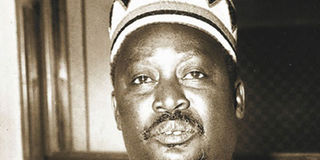When Kenyatta summoned Jaramogi, Mboya over rivalry

Jaramogi Oginga Odinga. He and Tom Mboya were political rivals. PHOTO | FILE | NATION MEDIA GROUP
What you need to know:
- Kanu was the favourite, owing to the support it enjoyed among the masses and the financial backing from communist countries through its vice president Jaramogi Oginga Odinga.
- Because of the restrictions imposed on communist aid by the colonial government, funds were channelled through their embassies in other countries, according to records at the British National Archives.
In May 1963, elections were held in Kenya to usher in internal self-government.
The results would determine if Kenya African Nation Union (Kanu) or Kenya African Democratic Union (Kadu) would form the government.
Kanu was the favourite, owing to the support it enjoyed among the masses and the financial backing from communist countries through its vice president Jaramogi Oginga Odinga.
Because of the restrictions imposed on communist aid by the colonial government, funds were channelled through their embassies in other countries, according to records at the British National Archives.
In London, Russians deposited £50,000 (Ksh6.4 million in today's exchange rate) which was collected by Otieno Othigo, while the Chinese gave £8,000.
In Dar es Salaam, Wilson Okondo Onyango and Okuto Bala collected £35,000 and £7,500 from Russian and Chinese embassies, respectively.
RIFT IN KANU
Okondo Onyango deposited the money in his account at Ottoman Bank, Mombasa, from where it was available to Jaramogi.
Other countries that made contributions were Egypt (£25,000), Ghana (£50,000), and People’s Republic of Korea (£8,000).
Despite the support, there was fear that Kanu was disadvantaged because of wrangles. Jomo Kenyatta’s ineptitude exasperated those concerned with the administration of the party.
They included Mwai Kibaki, John Keen and Onyango Ayodo. On January 19, 1963 they pointed out to him his shortcomings.
Their main complaint was that Kenyatta was incapable of making decisions as party leader.
The most prominent rift was between Jaramogi and Kanu Secretary-General Tom Mboya. Though it had been agreed that selection of party candidates should be free and fair, the two were scheming to push their candidates.
SUMMONED
To heal the rift, Kenyatta summoned Mboya and Jaramogi to his Gatundu home on October 28, 1962, according to a report prepared for the Governor titled “Kanu Internal Dissension” and marked “Secret, see and return”.
Kenyatta complained that he was spending too much time solving squabbles emanating from the rivalry, warning that Kanu was likely to lose the election or win by a small majority.
The two then signed an agreement “in the interest of Kanu”.
However, in something akin to the suspicion surrounding the March 2018 handshake between President Uhuru Kenyatta and ODM leader Raila Odinga, the truce immediately led to frustration among Jaramogi’s supporters who felt Mboya was using it to exert his influence over Kenyatta.
TRUCE DETRACTORS
According to a November 16, 1962 confidential report, on the afternoon of November 13, 1962, Jaramogi’s supporters — among them Fred Kubai, Bildad Kaggia, Pio Gama Pinto and Paul Ngei — after meeting at Achieng Oneko’s office, booked a meeting with Kenyatta at which they could air their grievances and view the agreement signed with Mboya.
Kenyatta refused to meet them unless Jaramogi was present. On the question of the truce, he simply said Jaramogi and Mboya had reached their own agreement and merely came to him for his endorsement.
Since Jaramogi was in Kisumu, the meeting never took place.
CABINET
For a time, the Gatundu rapprochement calmed the situation. However, the formation of the Cabinet following Kanu’s victory in the May 1963 elections created a new crisis which threatened the party’s unity.
To curtail Jaramogi’s influence, Mboya had prepared a paper for Kenyatta on the composition of the Cabinet.
He argued that because of the shortage of ministerial experience in Kanu, all ministers who had served in the Kadu/Kanu coalition government formed in 1962 be retained.
The writer is a journalist and researcher based in London





